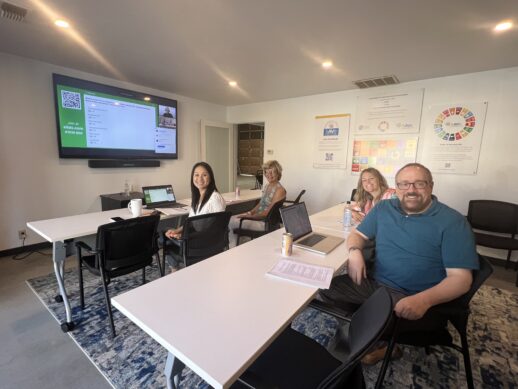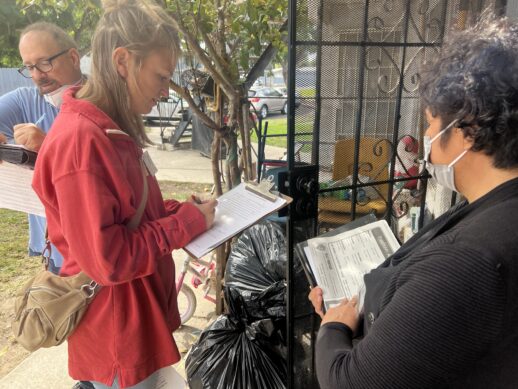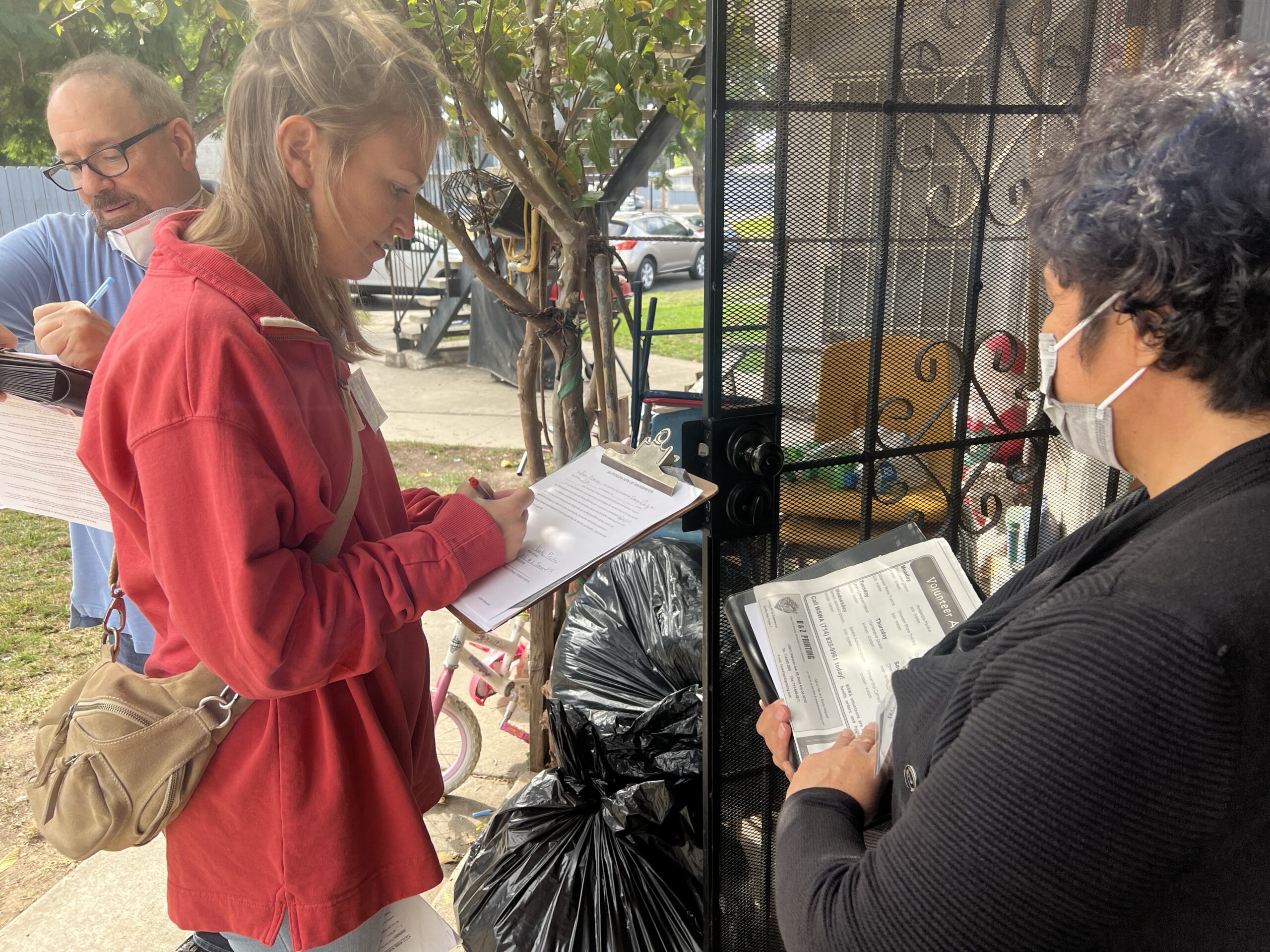Education and training are essential to building an organization like SAVe, and not just because we need to alert the world to our mission. We have to educate OURSELVES about the issues we’re addressing, the goals we’re setting, and how best to achieve them.
It’s step one in our journey to providing the effective leadership the AV industry needs to achieve the 2030 Sustainable Development Goals (SDGs).
Over the last few months, SAVe held two in-depth leadership training sessions for team members at our headquarters in Altadena, California. SAVe co-founders Christina De Bono, Thuy Chin and Joe Perez led the orientations, which were attended by stakeholders and SAVe board members including Debbie Williamson, Kelly Perkins and Tim Alevizos.
The SAVe Leadership Training Program provides both education and practical experience for board members and others who are committed to our mission. It’s an ongoing process, with a kickoff that dove deep into our mission and the organizing principles that will drive our success.

An Immersive Experience
Each leadership session took place over four days and began with a tour and orientation that included introductions to the team and a review of SAVe’s origins in ClearTech’s involvement with the Commission on Voluntary Service and Action, and SAVEs co-founder Christina De Bono’s 40 years of community organization experience. We also focused on the educational framework provided by the SDGs.
As SAVe board members live across the United States, the training sessions gave us the opportunity not just to get to know one another better, but to delineate roles, responsibilities and organization-building methodologies. Just as important, attendees were invited to share their individual visions for what they’d like to achieve as leaders.
Fortuitously, the October leadership training session occurred at the same time SAVe board member John Thomas had readied the first SAVe Training Class for an internal run-through. A one-hour overview of issues surrounding e-waste in the AV industry, it’s the first in a series of online educational modules that will be used to train SAVe volunteers and inform SAVe members about the issues we’re facing – and what we as an industry can do about them.
The name of our first, multi-part educational series: “Controlling E-Waste: There Is No ‘Away’ When You Throw It Away.” Each module will be presented in a hybrid webinar format, which will be recorded and made available on the SAVe YouTube channel.
Participating in the first of our online educational events was invaluable for leadership. While gaining information essential to advancing our objectives, we also achieved consensus on how best to structure our educational and training programs, and we did so much more efficiently than if we had been dispersed across the country.
Learning by doing, organizing for action
Gathering in person was also essential to gaining experience in the kind of grassroots organizing that’s necessary to spark systemic change.
One full day was devoted to meeting, training with, and actively assisting the Western Service Workers Association (WSWA) in their mission to meet the immediate needs of low-income service workers while pursuing solutions to the cause of low wages, lack of benefits and unsafe working conditions.
 What does neighborhood canvassing with the WSWA have to do with SAVe, and why was it important for our leadership team to immerse ourselves in its model of community action? First, SAVe and WSWA share a commitment to advancing sustainability. WSWA focuses more directly on Sustainable Development Goal #1 of ending poverty. SAVe is best positioned to make progress on SDG #12: responsible production and consumption. But all 17 SDGs are related, and by building bridges and sharing knowledge and resources among like-minded organizations, we can multiply our impact.
What does neighborhood canvassing with the WSWA have to do with SAVe, and why was it important for our leadership team to immerse ourselves in its model of community action? First, SAVe and WSWA share a commitment to advancing sustainability. WSWA focuses more directly on Sustainable Development Goal #1 of ending poverty. SAVe is best positioned to make progress on SDG #12: responsible production and consumption. But all 17 SDGs are related, and by building bridges and sharing knowledge and resources among like-minded organizations, we can multiply our impact.
Something else SAVe and WSWA share is our belief – borne out by history – that meaningful progress can only come from systemic change, and that grassroots organizing is the key to driving systemic change. WSWA generates support in ways that include neighborhood canvassing. SAVe employs other tactics, but the core methods are the same. We’re reaching people directly. We’re enlisting individuals to take up the cause and influence others to do the same. We’re also independent from government and industry. And we’re continuing the process until we achieve a groundswell that cannot be ignored.
The fact is, in 2015 the United States joined all 193 members of the United Nations in support of the 2030 Sustainable Development Goals. Our government endorsed the SDGs, vowed to act on them, and promised to report back regularly on our progress. Seven years later, we are one of five nations (including Yemen, Myanmar, Haiti and South Sudan) that have yet to issue even one progress report. The point is: Nothing’s going to happen unless we MAKE it happen. Low-paid workers won’t simply be granted fair pay and safe working conditions. They have to fight for their rights. Likewise, all of us in AV who care about the future of our businesses, industry, communities and planet have to organize, strategize and fight for needed change.
That’s why we also spent half a day with Sue Angus, Executive Director of the Commission on Voluntary Service & Action, a Los Angeles-based national organization whose mission is to “promote, interpret, coordinate and extend the field of independent voluntary service action programs serving people and communities in need of systemic solutions to economic, social and environmental problems.”
Propelling sustainable development
Founded in 1945, CVSA holds Special NGO Consultative Status with the Economic and Social Council of the UN, and is committed to the implementation of the 2030 Agenda for Sustainable Development in the U.S. and around the world.
A valuable partner for SAVe, CVSA comprises a large network of organizations that channel the energy of volunteers to advance systemic change. Its knowledge and other resources will be essential in our efforts both to build SAVe into an effective organization and to make progress in specific areas, such as developing networks for recycling, repurposing and responsibly disposing of electronic waste.
Since this is a blog post, not a novel, we won’t go into detail about everything else that went into the SAVe leadership training – including:
- Structuring our volunteer recruitment efforts
- Participating in CVSA’s “History of the 2030 SDGs” education session
- Laying the groundwork our SAVe’s application for Special NGO Consultative status with the UN
- Developing the SAVe Sponsorship Program for manufacturers
- Kicking off the first SAVe Movie Night, held outside ClearTech’s headquarters (the film: Dark Waters, starring Mark Rufallo as the attorney who took on DuPont after the chemical company contaminated a town with unregulated chemicals).
- …and creating pages of “To-Do’s” for the next few months.
It’s a privilege to report on our activities, and we’re grateful for your interest – and, we hope, participation – in our efforts. If you take nothing else from this post, let it be an understanding that we’re serious about sustainability in AV. Action is overdue, and we don’t have a moment to waste.
